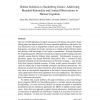868 search results - page 13 / 174 » Finding Most Likely Solutions |
AI
2010
Springer
13 years 4 months ago
2010
Springer
How do we build algorithms for agent interactions with human adversaries? Stackelberg games are natural models for many important applications that involve human interaction, such...
BMCBI
2006
13 years 7 months ago
2006
Background: The problem of finding a Shortest Common Supersequence (SCS) of a set of sequences is an important problem with applications in many areas. It is a key problem in biol...
CP
2004
Springer
14 years 1 months ago
2004
Springer
The success of stochastic algorithms is often due to their ability to effectively amplify the performance of search heuristics. This is certainly the case with stochastic sampling ...
ECOOP
2000
Springer
13 years 12 months ago
2000
Springer
In object oriented programming, it is sometimes necessary to copy objects and to compare them for equality or inequality. We discuss some of the issues involved in copying and comp...
CORR
2006
Springer
13 years 7 months ago
2006
Springer
The decision tree is one of the most fundamental ing abstractions. A commonly used type of decision tree is the alphabetic binary tree, which uses (without loss of generality) &quo...

